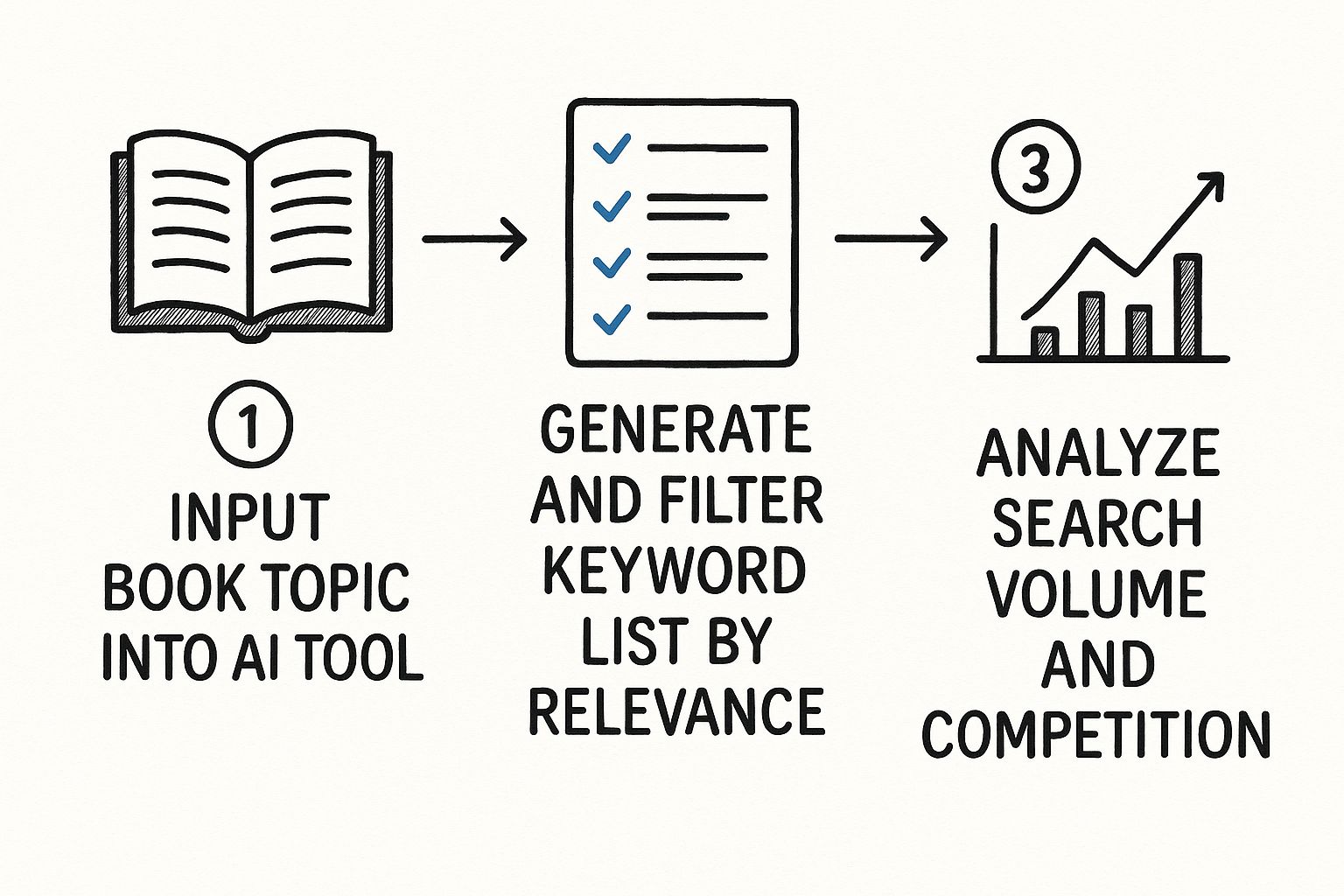AI Keyword Research for Books to Boost Sales

🔍 Part of Our AI Marketing Series: This article covers keyword research strategies in depth. For the complete marketing workflow that shows how keywords fit into your overall pre-launch, launch, and post-launch strategy, see our comprehensive Complete Guide to AI Book Marketing.
When it comes to AI keyword research for books, the real magic isn't about chasing those big, flashy search terms. It's about getting inside a reader's head and figuring out the exact phrases they type into a search bar when they’re hunting for their next favorite book. We're moving past generic categories and into the specific, nuanced world of reader intent.
Why Traditional Keyword Methods Fail Authors

Let's face it: the online bookstore is a crowded place. The old ways of getting discovered just don't cut it anymore. Relying on broad, high-volume keywords like "fantasy novel" or "thriller book" is like shouting into a hurricane—you're making noise, but no one who matters can hear you.
This is the fundamental flaw in old-school SEO. It misses the why behind a search. A reader almost never just looks for "sci-fi book." They're thinking in much more detail. Their search is more likely to be something like, "sci-fi novel with found family trope" or "mystery set in a remote arctic station." These are the conversational, highly specific queries that most standard tools completely miss.
Moving Beyond Search Volume
Getting hung up on search volume is a classic mistake. A keyword might get 10,000 searches a month, but if those searchers aren't looking for a book like yours, that traffic is worthless. This is where AI-driven keyword research for books really changes the game, shifting our focus to metrics that actually matter for authors.
The industry is already making this shift. The market for AI-powered research tools is projected to hit $1.5 billion by 2025, and a whopping 61% of marketers see AI integration as essential to keeping up. Why? Because these tools provide insights like content gap analysis and intent scoring, which are infinitely more useful than raw search numbers. If you're curious, you can explore some of the top AI keyword research tools on Superagi.com.
Uncovering Reader Pain Points and Desires
What AI does brilliantly is analyze the motivation behind a search, not just the words used. It sifts through mountains of data from book reviews, reader forums, and social media chatter to pinpoint what readers are genuinely craving in their next read. This gives authors the power to target keywords that tap directly into specific emotional triggers and narrative desires.
Key Takeaway: Success in today's book market isn't about being seen by everyone. It's about being discovered by the right readers. AI helps you find them by zeroing in on keyword intent, not just search volume.
For instance, instead of just targeting "romance novel," an AI tool can help you unearth gems like:
- "Enemies-to-lovers romance with witty banter"
- "Second chance romance for readers over 40"
- "Slow burn historical romance set in Regency England"
These long-tail keywords have less traffic, sure, but their conversion potential is through the roof because they perfectly match a reader’s specific taste. This is how you stop competing with everyone and start connecting with an audience that is actively looking for a book just like yours.
Brainstorming Your Core Concepts with AI
The first real step in using AI for keyword research has nothing to do with finding keywords. Surprising, right? It's all about teaching the AI what your book is really about.
Think of it like this: you're the director, and the AI is a brilliant but clueless actor. You can't just say "act sad." You need to give it the backstory, the motivation, the scene's context. Your job here is to move past simple, one-word genre labels and build a rich, detailed foundation of core concepts for the AI to work with.
Start by giving your AI tool of choice a "soup" of ideas. Throw in everything: your book's main genre, any sub-genres, the big themes, the central conflict, and even the emotional rollercoaster your main character goes on. Don't be shy with the details.
From Vague Ideas to Specific Prompts
Let's say you've poured your heart into a young adult dystopian novel. If you just ask an AI for "keywords for dystopian YA novel," you'll get the same bland, generic terms everyone else is using. We need to go deeper.
Your prompt should read less like a command and more like a detailed synopsis you'd send to a book reviewer.
For instance, a much more effective prompt would be something like this: "Brainstorm keyword ideas for a young adult dystopian novel. The story is set in a futuristic, eco-fascist society where technology suppresses citizens' emotions. The protagonist is a 17-year-old girl who discovers she can feel, and she joins a rebellion to dismantle the government. Key themes are individuality vs. conformity, environmental collapse, and the power of human connection. Think of it as a blend of Neal Shusterman and Marie Lu."
See the difference? This level of detail is what helps the AI generate nuanced, long-tail keywords that actually connect with the soul of your story. It starts making connections you might have overlooked.
A great prompt transforms an AI from a simple search engine into a creative partner. The more context you provide about your book's unique elements, the more specific and valuable its keyword suggestions will be.
Subscribe & Get Your Free Marketing Plan Template
Receive regular updates on marketing best-practices, AI shortcuts, and get our proven 4-phase marketing roadmap for free.
Unsubscribe anytime.
Now, instead of just "dystopian," the AI might spit back concepts you hadn't even thought to combine:
- YA fiction strong female lead corrupt government
- Coming-of-age story environmental collapse
- Teen rebellion against technological control
- High-tech society with suppressed emotions book
These aren't your final keywords. Not yet. Think of them as your seed keywords—the potent starting points for the real analysis we'll get into next. They capture the specific desires and search terms that compel readers to click "buy."
Of course, even with AI speeding things up, it pays to know the fundamentals. Having a solid grasp of how keyword research works will help you spot the gems in the AI's suggestions. If you need a refresher, this is a comprehensive keyword research guide that can build that foundational knowledge.
Ultimately, this blend of AI-powered brainstorming and your own human expertise is what makes this process so effective. You guide the machine, and the machine reveals possibilities.
Finding Keywords That Signal Reader Intent

Okay, you’ve got your list of seed concepts. Now for the fun part—the real hunt. We're about to sift through all that noise to find the "golden nuggets." I'm talking about the keywords that don’t just signal a reader's curiosity but their actual intent to buy.
There’s a huge difference. A broad keyword like "military history book" is informational; someone's just browsing. But a specific one like "best books about Roman legion tactics" shows a reader who is much, much closer to clicking "add to cart."
Our goal here is to unearth the exact phrases readers type when they’re actively comparing books or searching for a very specific experience. This is where using smart AI tactics gives you a serious leg up on crowded platforms like Amazon and Goodreads.
Uncovering Competitor Keyword Gaps
Honestly, one of the most powerful things AI can do is reverse-engineer your competition's success. It’s like having a spy on the inside. By analyzing the top-selling books in your niche, an AI can reveal the exact keywords that are working for them. This isn't about blindly copying, but about finding the opportunities they've overlooked.
You can start by feeding an AI a list of five to ten comparable titles—books that feel like they belong on the same shelf as yours. The AI then gets to work, analyzing their digital footprint and generating a report of the keywords they successfully rank for.
Let's say you've written a cozy mystery. Your analysis might show a competitor ranks well for "amateur female sleuth mystery series." But the AI could also highlight a "keyword gap" for a related, high-intent term like "cozy mystery with a cat sidekick." This phrase is likely less competitive but has an incredibly passionate, built-in audience. Finding these gaps is like discovering a pocket of readers just waiting for a book like yours.
These are the specific details that can truly sharpen your marketing. In fact, our guide on how AI-driven tactics to boost book marketing goes into even more detail on this.
Mining the SERPs for Questions and Comparisons
To find high-intent keywords, you have to think like a reader who’s ready to buy. What do they search for? Often, it's questions or comparisons. AI tools are exceptionally good at digging through Search Engine Results Pages (SERPs), forums, and review sites to pull out these valuable phrases.
Keep an eye out for patterns like these:
- Comparison Queries: "Nalini Singh vs Ilona Andrews"
- "Best of" Lists: "Best epic fantasy books of the last decade"
- Problem-Solving Searches: "Books to read after finishing The Martian"
These aren't just idle searches; they are direct pleas for a specific recommendation. When you target these phrases in your book’s metadata and marketing copy, you place your book directly in front of a reader who is itching to discover their next favorite author.
By focusing on the language of commitment—questions, comparisons, and "best of" searches—you align your book's discoverability with the final stages of a reader's decision-making process.
This whole approach is changing how authors and publishers think about organic search. AI tactics are uncovering high-value keywords that traditional tools often miss, and the results can be dramatic. The data shows that AI-powered keyword strategies can deliver conversion rates 4.1 times better than those from non-AI tools, while facing about 37% less competition. It's a game-changer.
How to Validate and Prioritize Your Keyword List
Alright, so you’ve used AI to generate a mountain of keywords. It’s an exciting place to be, but looking at that sprawling list can also feel a bit overwhelming. The real work starts now: turning that raw data into a short, powerful list of keywords that will actually get your book in front of the right readers. This is where we stop brainstorming and get strategic.
Think of this part of the process as a blend of art and science. You'll lean on AI-powered data to evaluate each term, but your own gut feeling as an author is just as crucial. After all, you’re the only one who truly knows if a keyword captures the soul of your book.
This infographic breaks down the initial steps of gathering and filtering that data.

As you can see, it’s a clear path from defining your book's core identity to analyzing the metrics behind each keyword, which is exactly what we need to do to validate them effectively.
Separating Gold from Gravel
First things first, let’s clean up the list. Your initial pass is all about relevance. Scan through everything the AI spat out and immediately toss anything that feels off. For example, if you wrote a gritty, realistic crime novel, a keyword like "lighthearted amateur detective story" is an instant 'no,' regardless of how many people are searching for it. Trust your instincts here.
Next, it's time to look at the numbers. Most good AI keyword tools will give you two key pieces of information for every term:
- Search Volume: A solid estimate of how many times people search for that keyword each month.
- Keyword Difficulty (KD) or Competition: A score that tells you how tough it will be to rank for that keyword against other books.
My Two Cents: Don't get star-struck by huge search numbers. A keyword with 5,000 monthly searches and low competition is almost always more valuable than one with 50,000 searches where you're up against the big publishing houses.
The Prioritization Matrix
Here’s a simple way to visualize this. Picture a four-quadrant grid. One axis represents search volume (from low to high), and the other represents competition (also low to high). The sweet spot, the place you want to live, is the high-volume, low-competition quadrant. These are your golden tickets.
Let's walk through a real-world scenario. Imagine your AI generated 200 keywords for your historical fiction novel about the California Gold Rush. Here’s how you’d whittle that down:
- The Initial Cut: You go through and immediately delete 50 keywords that just don't match your book's tone, plot, or characters.
- The Data-Driven Purge: Next, you filter the list based on the metrics. You might eliminate another 100 keywords because they have almost no search volume or the competition is just ridiculously high.
- The Final Shortlist: Suddenly, you’re looking at a much more manageable list of about 50 promising keywords. From this group, you can hand-pick your final 7-10 best terms to use for your book.
If you’re publishing on Amazon and want to get really specific, our guide on https://manuscriptreport.com/blog/amazon-kdp-keywords dives much deeper into the nuances of that platform. As you get comfortable with this, you can even find ways to automate your keyword research process to speed up the analysis.
Ultimately, your goal is to build a balanced keyword portfolio. You want a mix of broader terms to cast a wide net and some super-specific, long-tail keywords to attract readers who know exactly what they want and are ready to buy. That's the secret to making AI-driven keyword research work for you.
Weaving Keywords into Your Book's DNA

Alright, you've put in the work and have a fantastic list of keywords. Now for the most critical step: strategically placing them where they’ll actually do some good. This isn't about clumsily stuffing phrases into your marketing copy. It’s about weaving them seamlessly into your book's digital identity.
Getting this right is what makes Amazon and Google sit up and take notice. Proper placement tells their algorithms exactly what your book is about, creating a direct line between you and the readers actively searching for a story just like yours. This is where solid AI keyword research translates into actual sales.
It's no secret that AI is changing the SEO game. A recent study shows 86% of marketing professionals now use AI tools in their work. For authors, this means our metadata has to be sharper than ever. With features like Google’s AI Overviews already appearing in over 13% of search results, platforms are favoring content with crystal-clear, authoritative data. Your keyword placement just became more important than you think.
Your Title and Subtitle: The Prime Real Estate
Think of your title and subtitle as the most valuable real estate you own. They're the headline that either grabs a reader or lets them scroll right on by. This is the place to put your most important keyword, if you can make it work naturally.
Let's say your main keyword is "military sci-fi with alien invasion." A powerful title and subtitle could look like this:
- Title: Orion's Fall
- Subtitle: An Epic Military Sci-Fi Adventure of Alien Invasion
This approach hits the sweet spot. The title is memorable and brandable, while the subtitle feeds the algorithm exactly what it needs to find the right audience. It's a win-win.
Writing a Book Description That Sells and Ranks
Your book description is your sales pitch, but it's also a major tool for discoverability. You want to place your primary keyword somewhere in the first sentence or two. This immediately signals to both the reader and the algorithm that they're in the right place.
After that, sprinkle in your secondary keywords. The trick is to make it sound completely natural. You're still telling a compelling story about your book; you’re just using your keywords to frame the characters, conflict, and core themes.
Pro Tip: Read your description out loud. Does it sound clunky or forced? If so, you’ve gone too far. You're aiming for persuasive, human-first copy that also happens to be optimized for search. True discoverability lives at that intersection.
If you're looking for help integrating these keywords smoothly, a good AI editor tool can be a lifesaver. It can help you find natural ways to weave them into your book's DNA without sacrificing readability or flow.
Tapping into KDP Backend Keywords
Amazon gives you seven backend keyword slots inside KDP. This is your secret weapon. It’s the perfect spot for all those long-tail keywords and search variations you found that just didn't fit into your title or description.
Don't waste this space by repeating keywords already in your title, subtitle, or description. Instead, use these slots to target adjacent concepts and specific reader interests.
- Use all seven slots. Don't leave any empty.
- Max out the character count. Use the space you're given.
- Think like a reader. What else might they search for?
- Include tropes, archetypes, and settings. Think "found family," "brooding anti-hero," or "cyberpunk London."
Effectively weaving keywords into these core areas is a non-negotiable part of modern self-publishing. For a comprehensive look at how AI tools are transforming the entire publishing workflow, check out our complete guide to AI-powered book publishing.
Of course. Here is the rewritten section with a more natural, human-expert tone.
Still Have Questions About AI Keyword Research?
Diving into AI for your book’s keywords can feel a bit like stepping into a whole new world. That's totally normal. Most authors have a few questions when they first get started, so let’s clear up some of the most common ones I hear.
A big one is cost. Authors often worry they need to shell out for complex, expensive software to see any real results. The good news is, you don't. While the big names like Ahrefs or Semrush are incredibly powerful, they’re often overkill for an author just starting out—not to mention their price tags and steep learning curves.
Honestly, simpler is usually better when you're finding your footing. I always recommend authors start with tools built specifically for books or those with really clean, intuitive designs. Many have free versions or trials, which is a perfect way to test the waters without any financial pressure. The goal is to find a tool that shows you the data you need without drowning you in technical jargon.
Okay, But How Much Time Will This Actually Take?
This is the second question I always get: is this a five-minute job or a week-long headache? The truth, as it usually is, lies somewhere in the middle.
Be realistic with your first go-around. You're learning a new skill, so expect to set aside a few hours for your first book. You'll be spending that time brainstorming your initial ideas, feeding them to the AI, and then digging into what it spits back out. From there, you have to validate that list by checking which keywords actually have decent search volume and aren't impossible to rank for.
Once you have your final list, you still have to work those keywords into your title, subtitle, and book description. But here’s the thing: it gets so much faster. After you’ve done this for a couple of books, you'll get into a rhythm. You’ll know what to look for, and you'll be able to knock out the whole process in just a couple of hours.
That initial time commitment isn’t just for one book. Think of it as an investment in a skill that will pay dividends across your entire author career. You’re learning to think like a marketer, and that’s priceless.
How Do I Know If Any of This Is Working?
You've done the work, but how do you know if it's actually making a difference? Measuring the impact of your new keywords is key, but you have to know where to look. While book sales are the ultimate goal, they’re a lagging indicator. You want to look for the early signs that you’re on the right track.
Here are the leading indicators I tell authors to watch:
- Your Amazon Rank Improves: Keep an eye on your book's sales rank within its categories. If you see it start to climb after you've updated your keywords, that’s a fantastic sign that you're getting more visibility.
- Page Reads Increase (for KDP Select authors): If your book is in KDP Select, a bump in your Kindle Edition Normalised Pages (KENP) read is a direct signal. It means more of the right readers are not only finding your book but are actually diving in.
- You Get More (and Better) Reviews: When your keywords connect your book with its ideal audience, you'll start to see more organic reviews. And they won't just be star ratings; they'll be thoughtful comments from people who "got" your book because your keywords led them right to it.
Tracking these early metrics gives you a much clearer, faster picture of your progress than waiting for your royalty statement. It’s the proof you need that your AI-assisted strategy is working, connecting your story with the very readers who were already searching for it.
Ready to skip the learning curve and get all your book’s marketing assets in one place? ManuscriptReport.com uses advanced AI to generate a complete marketing kit for your book in about 10 minutes. Get everything from optimized keywords and KDP categories to blurbs, ad copy, and social media posts, all tailored to your unique story. Transform your manuscript into a launch-ready asset today at https://manuscriptreport.com.
Enjoyed this article? Subscribe for more + get a free marketing roadmap template.
Receive regular updates on marketing best-practices, AI shortcuts, and get our proven 4-phase marketing roadmap template for free.
Unsubscribe anytime.
Related Articles

6 Essential Book Marketing Strategies for Romance Novels
Discover 6 proven strategies to market your romance novel effectively and boost sales.

7 Essential Book Giveaway Strategies to Build Loyalty
Discover 7 essential book giveaway strategies to boost reader loyalty and engagement.

AI Book Cover Design: Complete Guide + 12 Best Tools (2026)
Master AI book cover design with our complete guide. Discover 12 best tools, step-by-step process, and proven strategies to create stunning covers that boost sales.